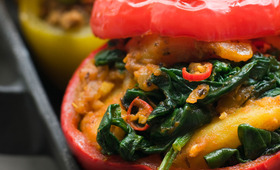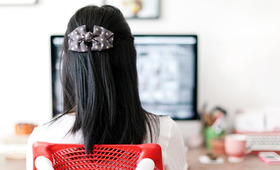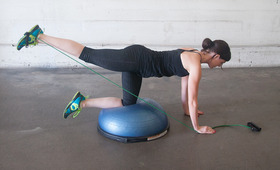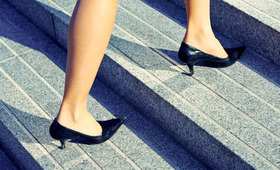

Recently suffering from low energy levels, I decided to see an alternative medicine doctor my friend had recommended to me. While there, I sat on the chair in his office as he asked me to hold up my left arm in front of me. He then placed his hand on my arm and asked me to resist his gentle downward push. With no problem, my arm stayed put with full strength. Mentally, I was treating it like it was arm wrestling—and I wanted to win.
With his other hand, he started tapping the top of my head, then my forehead, my neck, my shoulder, and the list goes on. While he was tapping, he would push down on my arm asking me to maintain resistance every time he pushed. As he scanned my body, my arm stayed in place with full determination.
Then suddenly, with a gentle tap to my right side, he said, “Resist.” And as he pushed my arm, it frantically flopped to my side like a sad rag doll thrown on the floor.
“What happened?” I asked in amazement and disbelief. “I resisted as hard as I could! No way. Please do it again.” Lo and behold, the same result.
With a slight laugh he simply replied, “That’s your liver. It’s a little weak.”
Traditional to Chinese medicine and applied kinesiology, muscle testing is an alternative, noninvasive healing tool used as a way of determining imbalances in the body such as nutritional deficiencies, energy blockages, organ function, and food allergies. It is a method that asks the body yes or no questions, relying solely on the body to answer them. Think of the body as one large electrical network. If the body is in balance, and there is a positive association, the answer is a “yes” and the muscle stays strong. On the other hand, if there is a potential weakness or blockage, this will create a negative “no” response and the muscle will not be able to resist applied pressure. It can also determine whether or not certain herbs are right for the body and, if they are, in what quantities should they be taken. But please, know that this should not be a replacement for conventional medical practices and should not be relied on as the sole diagnosis.
The idea of the body’s natural intuition is an interesting and comforting idea, and I will admit that I do feel better and more energetic since my appointment. What I especially love most is the notion that sometimes answers to seemingly large questions can be reduced down to an obvious yes or no. So if you want to experiment with a few self muscle testing techniques on your own, try these three techniques and let me know what happens.
STANDING TILT
Stand up and face north.
Relax your whole body.
Ask your body a question, silently. For instance “Am I sensitive to sugar?”
If it’s a yes, your body will tilt forward.
If it’s a no, your body will tilt backwards.
LEG TESTING
Place one ankle on the top of the opposite thigh at the knee.
Place both hands against the back of the calf of the top leg.
As you ask questions, press the top leg away from you.
If yes, the top leg stays on the thigh of the bottom leg.
If no, the top leg falls off the thigh of the bottom leg.
CIRCLE AND PRESS
Make a circle with the thumb and ring finger of your non-dominant hand.
Insert the thumb and index fingers of the other hand into this circle from the bottom.
Hold light tension in the circle.
As you ask questions, press the fingers inserted into the circle outward.
If yes, the circle stays closed and holds the pressed fingers inside.
If no, the circle opens.
Kit Rich is Los Angeles-based fitness trainer with endless exercise and nutritional know-how. Hollywood's hottest stars are addicted to Kit's unique, multi-disciplined approach that combines cardio, yoga, Pilates, and weight training. Kit's clients are immediately taken by her funny and honest approach to health and fitness. She treats her clients as she treats herself, "with a hard challenge, sensibility, sensitively, and a good laugh." Follow Kit on Twitter @kitrichfitness.
The information provided cannot substitute for the advice of a medical professional. If you have any questions about any medical matter please consult your healthcare provider. Self Muscle Testing Techniques provided by www.hblu.org
You Might Also Like
-

outFit with Kit
Are New Year’s Fitness Resolutions Setting You Up For Failure?
- 443
-

Wellness
Beauty Detox: Rainbow Peppers
- 190
-

outFit with Kit
A Model Shares Wisdom About the Power of Being Healthy and Confident
- 324
-

outFit with Kit
outFit With Kit: Sitting Fit
- 403
-

outFit with Kit
Three Moves to Firm and Lift Your Booty! Bosu Routine Part 3
- 1329
-

Fitness
5 Small Steps To Change Your Body Dramatically
- 573



 Kit Rich is Los Angeles-based fitness trainer with endless exercise and nutritional know-how. Hollywood's hottest stars are addicted to Kit's unique, multi-disciplined approach that combines cardio, yoga, Pilates, and weight training. Kit's clients are immediately taken by her funny and honest approach to health and fitness. She treats her clients as she treats herself, "with a hard challenge, sensibility, sensitively, and a good laugh." Follow Kit on Twitter @kitrichfitness.
Kit Rich is Los Angeles-based fitness trainer with endless exercise and nutritional know-how. Hollywood's hottest stars are addicted to Kit's unique, multi-disciplined approach that combines cardio, yoga, Pilates, and weight training. Kit's clients are immediately taken by her funny and honest approach to health and fitness. She treats her clients as she treats herself, "with a hard challenge, sensibility, sensitively, and a good laugh." Follow Kit on Twitter @kitrichfitness.



